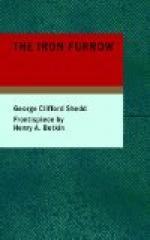It was the middle of the month. Three weeks previous, with the bonds sold and the injunction suits dismissed, the contractor employed had unloaded his outfit at Kennard, moved up the Pinas River, raised in a day his camp at the mouth of the canon above Bartolo, and begun his task. This man, Pat Carrigan, had been in Bryant’s mind from the first: a Pueblo contractor of Irish extraction, born in a railroad camp, trained on a dump, and now grizzled and aging but unequalled in handling men, in keeping them satisfied, in moving dirt. In his time he had turned off jobs from Maine to California, from Wisconsin to Texas. Already along the hillside a yellow gash was deepening from the dam site through the fenced fields where ran the right of way; while in the Pinas, low at this season, the traverse section of the river bed had been cleaned out and the base of the dam was building of stones and brush.
Late on a certain afternoon Ruth Gardner and Imogene Martin stood waiting by a gray runabout at the edge of the camp. A storm was sweeping up the Ventisquero Range from the south, one of the autumn storms that marked the change of seasons, enveloping, as it advanced, the gray peaks one after another in its fog and trailing over the mesa gauzy brown streamers of rain. In the west the sun still shone unobscured, but with its light failing to a chill saffron glare as the cloud expanded over the sky.
Bryant and another man, a newcomer in the last few days, an engineer from the East representing the bondholders, were walking toward the girl from the dam. As the men walked, they engaged in rather spirited argument.
“You’d better hurry, you two,” Ruth called. “Don’t you see that rain coming? Imo and I want to reach home, Mr. Gretzinger, without being soaked.”
Bryant’s companion waved an assuring hand without ceasing his rapid and forceful statement addressed to his fellow. Half a head shorter than Lee, he was of stockier build, a man somewhere near thirty-five or six years of age, with hair tinged with gray above his ears. Both in manner and speech he exhibited by turns superficial gayety, latent cynicism, and an egregious assumption. When Lee had introduced him to the young ladies at Sarita Creek, he had made himself at home in three minutes. He had the latest witticisms of restaurants and theatres, the newest stories, the most recent slang; his clothes were of the autumn’s extreme mode; he was intelligent if frankly materialistic; and he interested, amused, and diverted the two girls. From his gay and airy talk they gathered that he had been married and divorced, that the West might have the scenery but New York had the bright lights; that money could buy anything from food to fame; and that “movies” were a bore. To the girls he was like a breath from the metropolis itself, that hard, throbbing, restless, glaring, convivial, avid, fascinating city in which is centred everything of wealth and misery,




